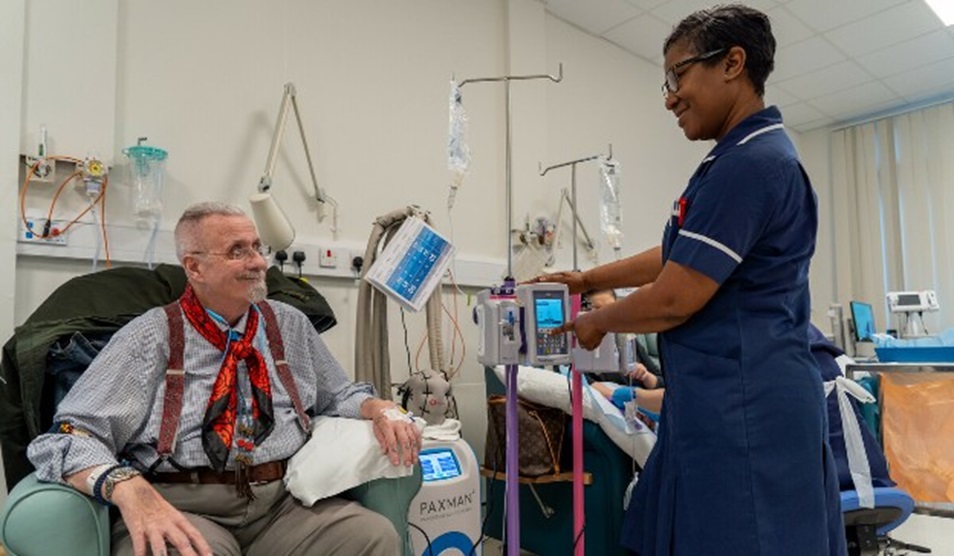Liver cancer
Contact
- General Enquiries
- 020 3313 1000
Visitor Information
Translation help:
To translate this page into your preferred language, click the Google Translate icon in the top-right menu and select your desired language.
About
Our liver cancer service at Hammersmith Hospital is the UK’s only specialised service providing the joint expertise of a liver specialist and a cancer specialist for patients with a suspected, current or previous diagnosis of primary liver cancer.
This unique clinical service is jointly provided by liver specialist Dr Shahid Khan, and cancer specialist Dr Rohini Sharma, who work together to address both the cancer and liver issues. This provides a more efficient service for patients and better overall management of their condition. The service is supported by a specialist Macmillan nurse who provides and coordinates ongoing community support for patients and their families.
Both Dr Khan and Dr Sharma have joint appointments with Imperial College London, ensuring new discoveries are rapidly translated into the clinic for the benefit of patients. We use a multidisciplinary team approach to the management of liver cancer, including cutting edge therapy in surgery, ablation, chemo-embolisation and systemic therapies.
For liver cancers, surgery is the most effective treatment, and it is therefore essential to conduct proper surgical evaluation as an important part of treatment planning. We have developed the ability to reconstruct a 3D image of the patient's liver based on preoperative CT scans. With this technique the surgeon can pinpoint precisely the site, size and location of the liver tumour, and most importantly, calculate the future remnant liver volume after liver surgery to prevent unnecessary removal of normal liver tissue. We perform over 120 liver operations each year. We do not give routine blood transfusions for patients having major liver operations. This allows patients to go home much earlier and without need for intensive care treatment.
The HPB unit has also pioneered laparoscopic methods for both the diagnosis and treatment of hepatobiliary cancers. Patients who have undergone a resection with this technique can go home much quicker with minimum trauma and discomfort. For those patients who may not be suitable for surgical resection, various treatment options have been developed. We use innovative and effective treatments such as 'radiofrequency ablation' and 'microsphere local radiation therapy' where tumours are unresectable.
Conditions and treatments
The liver is the largest internal organ in the body. It has a major role in producing energy for the body and breaking down toxins. It lies below the diaphragm and behind the ribcage.
The majority of liver tumours are malignant (capable of spreading elsewhere in the body) and can be divided into two main groups:
- Primary liver cancer – tumours arising from the liver: Primary liver cancer is also called hepatocellular carcinoma (HCC). It is nearly always caused by long-term damage to the liver from either viral infections, such as hepatitis B and hepatitis C, or 'hardening' of the liver (cirrhosis) from prolonged over-consumption of alcohol. In the UK, HCC is less common than secondary liver cancer and is usually caused by liver cirrhosis.
- Secondary or metastatic liver cancer – tumours spreading to the liver from other organs or systems in the body by either the blood or lymphatic system: Secondary or metastatic liver cancer is often caused by the spread of cancer from the large bowel (colorectal cancer). This is the most common form of liver cancer in the UK. Around one-third of patients with colorectal cancer will also develop metastatic liver cancer.
We offer three types of treatment for liver cancer:
- Liver resection (surgery): The best treatment for both primary and secondary liver cancer is to surgically remove the part of the liver that is affected by the tumour, known as a liver resection.
- Selective internal radiation (SIR) therapy: This is a new method of treating both primary and secondary liver cancer using selective internal radiation (SIR). It involves the injection of millions of tiny beads, or 'microspheres', each smaller than the width of a human hair, into the liver. Each microsphere emits radiation into the tissue surrounding it, acting as a localised form of radiotherapy that targets tumour cells constantly over a period of several days.
- Thermal ablative therapy: At Hammersmith Hospital we are offering a new experimental procedure for patients with liver cancer whose tumours are not suitable for complete resection. The treatment is called thermal ablation and it uses heat to kill the tumour cells to prevent them from spreading. Because it is a new procedure, we do not have long-term data to say how effective it is, although some patients have benefited from the procedure. It is important to note that thermal ablation is palliative rather than curative – we offer it in the hope that it will relieve symptoms and enable chemotherapy to delay the progress of the disease.
Additional information
Clinical trials and research
We have a strong interest and dedication to research into primary liver cancer. Currently, we have a number of clinical trials in a range of different areas including novel imaging techniques, chemo-embolisation and novel therapeutics. You may be asked whether you are willing to participate in a study. If you do not want to participate it will not in any way affect your treatment.
Further online resources
Latest news See all news
-
 Read the full story
Read the full storyImproving cancer care pathways at Imperial College Healthcare
In February 2024, we kicked off a major programme to find out how we could make our cancer care pathways work better for patients and their families, drawing directly on their views and ideas as well as those of our staff and care partners. While…
-
 Read the full story
Read the full storyUltrasound scan can diagnose prostate cancer
An ultrasound scan can be used to detect cases of prostate cancer, according to new research by Imperial College London, University College London and Imperial College Healthcare NHS Trust. The study found that a new type of ultrasound scan can…
